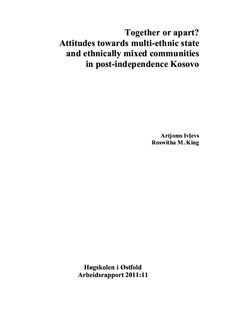Together or apart?: Attitudes towards multi-ethnic state and ethnically mixed communities in post-independence Kosovo
Working paper
Permanent lenke
http://hdl.handle.net/11250/147483Utgivelsesdato
2012-06-29Metadata
Vis full innførselSamlinger
Sammendrag
The success of Kosovo as an independent and multi-ethnic state depends crucially on the ability and willingness of different ethnic groups to live and work together. We explore the attitudes towards multi-ethnic state and ethnically mixed living in post-independence Kosovo. The study is based on a survey (face-to-face interviews) of 1367 respondents carried out in Kosovo four months after it proclaimed independence. The ordered and multinomial probit analysis suggests that, compared to the ethnic Albanians, the ethnic Serb minority is less likely, and the non-Serb minorities are more likely, to believe in the viability of Kosovo as a multi-ethnic state and to consider that different ethnicities should live in mixed areas. The elderly, people with higher incomes, students and the unemployed are more likely to report that Kosovo can work out as a multi-ethnic state. Females and people from rural areas tend to be more favourably inclined toward different ethnicities in Kosovo living in the same communities. The respondents living in the ethnically mixed and politically troubled northern Kosovo region report more negative attitudes towards Kosovo as a multi-ethnic state, but are less likely to consider that different ethnicities in Kosovo should live in separate communities.
